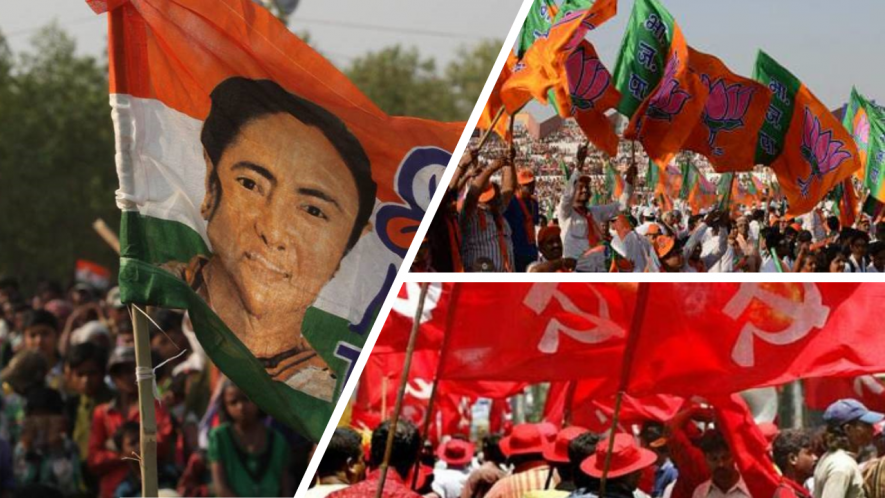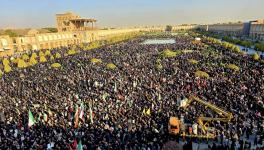Why Bengal Poll Outcome is a Rejection of BJP’s Communalism

The resounding electoral loss of the BJP in the West Bengal Assembly poll has again proved that non-BIMARU states are a tough nut to crack for the saffron party. The sort of election blitzkrieg managed by the BJP across this politically crucial state had most political observers believe that the BJP would hammer the Chief Minister Mamata Banerjee-led Trinamool Congress government. Several pre-poll surveys supported this line of thinking too. Most of these soothsayers were ‘outsiders’ who had been airdropped into West Bengal by media organisations. They were likely mesmerised by the massive scale at which the BJP had organised its election campaign.
Prime Minister Narendra Modi and Union Home Minister Amit Shah addressed giant rallies in almost every nook and corner of the state, with dozens of ministers and Members of Parliament in tow. Defections were being engineered for weeks, to chip away at Banerjee’s aura of invincibility. A pliant mainstream media reported every defection from the Trinamool Congress, even if it was a panchayat-level leader who was leaving. They willfully ignored many developments that favoured the Opposition parties, including leaders joining the Trinamool bandwagon. The initial plan of the BJP entailed having the Prime Minister address 20 rallies and Shah a staggering 50 rallies, over around a month of electioneering. However, the final tally was possibly much higher, as the BJP seemed to have convinced itself it was within sniffing distance of an upset in power Bengal.
In the end, BJP won just 77 seats, while the Trinamool Congress won 113 seats. The vote-share of Mamata’s party rose significantly to 48% of all votes polled. On the other hand, the BJP could get merely 38% votes, lower than its tally in the Lok Sabha election held merely a year and a half ago. The near-total support to Trinamool from the Muslims may have been a crucial factor in these polls. Despite predictions, votes did not get divided as many pollsters had expected. There were apprehensions that Muslim votes would get divided between the Trinamool and the Congress-Left-ISF alliance. However, this did not happen, as the Muslims supported the party poised to defeat the BJP across the state.
Muslims are around 30% of the population of West Bengal. According to the 2011 Census, there were 24.6 million Muslims in the state. Of these, roughly 20 million are Bengali Muslims who constitute 80% of the total Muslim population in the state. The rest are Urdu-speaking Muslims, concentrated mainly in Kolkata and other urban centres. The Muslim vote is a crucial deciding factor in around 130 Assembly seats in the state. The results of this election suggest that the community—be it the Bengali-speaking or Urdu-speaking section—solidly backed one party to ensure its victory.
Another significant feature of this election is that the Muslim voters rejected political parties that claim to represent Muslim interests, such as the All India Majlis Ittehadul Muslimeen (AIMIM) of Hyderabad-based Member of Parliament, Asaduddin Owaisi. They also did not let their votes split between Trinamool and other parties such as the Indian National Congress and the Left outfits.
Ever since five of its candidates had won in Bihar in the last Assembly election, the hopes of the AIMIM had been soaring. However, in a strongly polarised election that had essentially become a Modi vs. Mamata fight, its candidates failed to attract Muslim voters. They collectively got just around a thousand votes from seven Assembly segments. AIMIM had fielded candidates from Itahar, Jalangi, Sagardighi, Bharatpur, Malatipur, Ratua and Asansol North Assembly constituencies, where the Muslims are an overwhelming majority. However, the party failed to convince the Muslim voters.
Former Rajya Sabha member Moinul Hasan tells this author that the defeat of the BJP is the victory of secularism over communalism. He says, “The people of Bengal have rejected all sorts of communalism, be it Muslim or Hindu communalism.” While Muslims in Bengal are religious, they are not communal and this election has made this distinction clear. “This is why Furfura Sharif pirs (religious leaders) failed to convince even ardent supporters to support their new party,” he says. Reports say that some Furfura Sharif pirs opposed the idea of launching their political party. However, says he, even if they had all been united in their political dreams, the electoral outcome would have been the same.
In the polarised scenario created by the BJP’s high-pitched campaign in West Bengal, even Abbas Siddiqui’s Indian Secular Front or ISF could not deter the Muslim voters to vote for the outfit they believed would oust the BJP. For this reason, the Furfura Sharif, despite its influence over a wide section of the Muslim community in the state, could not divide Muslim voters even to steer them even towards the Congress or Left.
Most observers had predicted that the Furfura votes would deal a heavy blow to the Trinamool’s minority support base. Instead, the ISF could only win one of the thirty seats it had secured from the alliance. This is the Bhangar Assembly constituency where Abbas Siddiqui’s brother, Md Nawsad, won by a margin of around twenty-five thousand votes. So, the election result is a body blow for the political ambitions of the pirs of Furfura Sharif.
Mohammad Reyaz, who teaches at Kolkata’s Aliyah University has an important counterpoint on this issue. According to him, the ISF was unprepared for an electoral contest. “It was launched barely a few weeks ago. Although Abbas Siddiqui held some rallies, they were not election-ready, so much so that it fought on the symbol of another outfit. No one in Bengal thought they would win. His brother won from Banghar as that is their core area of influence. Also, there was lot of anger against Trinamool there due land acquisitions and subsequent protests a few years ago,” Reyaz says.
To win an election, one needs to spend time and work on the ground for years. The lack of BJP’s organisational infrastructure in the state is another reason why the saffron party performed so poorly in this election. “Muslims in South Bengal voted for the Trinamool in the last two elections as well. Plus, there was consolidation around the Trinamool this time, and that also helped them,” says Reyaz.
That said, the near-total support of Muslims for the Trinamool is largely due to the communal rhetoric adopted by the BJP during its election campaign. The party had been threatening to introduce the National Register of Citizens and the National Population Register (NRC and NPR) in West Bengal, which did not go down well with the Bengalis. Besides, both the Muslims know how the Bengali Muslims living in Assam are suffering due to the NRC.
Many, despite proving citizenship, have been thrown into detention camps. The fear of the NRC and NPR forced the community to support the party poised to defeat the BJP and ensure a victory for the Trinamool.
Hasan calls this election outcome an instance of “reverse polarisation”. While the BJP wanted to polarise the Hindu votes, what ended up happening is the consolidation of Muslim voters and all others who oppose the BJP’s ideology of hate. They all got together behind the Trinamool Congress to nix the BJP’s chance of snatching a victory.
The author is a writer and columnist. The views are personal.
Get the latest reports & analysis with people's perspective on Protests, movements & deep analytical videos, discussions of the current affairs in your Telegram app. Subscribe to NewsClick's Telegram channel & get Real-Time updates on stories, as they get published on our website.
























